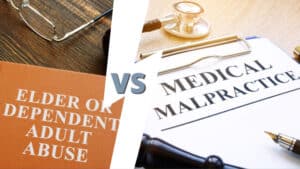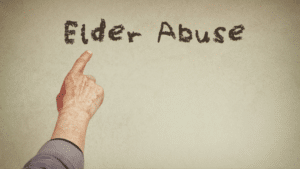Written By: Chris Dolan and Cioffi Remmer
This week’s question comes from Jane from Dublin, CA, who asks: I’ve seen news reports about cases of elder abuse. I know someone who may be a victim. Can you explain what constitutes an Elder Abuse case?
Almost 40 years ago, the California legislature enacted the Elder Abuse and Dependent Adult Civil Protection Act to protect the elderly and dependent adults from abuse, neglect, and abandonment by caretakers, nursing facilities, and other custodial care providers. The statutes were enacted under the California Welfare & Institutions Code § 15600, et. seq.
Even where an elder or dependent adult may not suffer physical injury but suffers financial injury, California established a cause of action for Financial Elder (or Dependent Adult) Abuse. This occurs when a person or entity takes, appropriates, obtains, or retains real or personal property of an elder or dependent adult for wrongful use or with intent to defraud. (Welfare & Institutions Code § 15610.30). This includes, but is not limited to, the all-too-common practice of identity theft, which can come with hefty criminal penalties.
One of the main purposes was to enact reporting requirements for health practitioners, care custodians, clergy members, and employees of county adult protective services and local law enforcement agencies of known or suspected cases of abuse of elders and dependent adults and to encourage community members to do so. (Welfare & Institutions Code § 15601(a)).
Elder and Dependent Adult abuse cases differ from negligent injury cases in that the legislature provided additional remedies not available in garden variety negligent cases. If a custodial caregiver is liable, the remedies include recovery of attorney fees, costs, and the availability of punitive damages. (Welfare & Institutions Code § 15657).
In California, an elder is anyone residing in the state, 65 or older. (Welf. & Inst. Code § 15610.27). On the other hand, a dependent adult refers to anyone between 18 and 64 residing in California who has physical or mental impairments that limit their ability to carry out normal activities and protect their rights. This includes individuals with physical or developmental disabilities or those whose physical or mental abilities have declined due to aging. Additionally, anyone between 18 and 64 years of age admitted to a 24-hour health facility as an inpatient is considered a dependent adult. (Welf. & Inst. Code § 15610.23).
As mentioned earlier, elder abuse refers to any action that involves mistreatment of an elderly or dependent adult. Abuse can be defined as physical harm, neglect, abandonment, isolation, abduction, or any other treatment that results in physical harm, pain, or mental suffering. Abuse can also be categorized as the deprivation of goods or services necessary to prevent physical harm or mental suffering or as financial abuse.
Neglect can refer to several things, such as failing to assist with personal hygiene or providing medical care for physical and mental health and safety hazards. Additionally, neglect can be defined as the failure to prevent malnutrition, dehydration, and other forms of neglect outlined in Section 15610.57 of the Welfare & Institutions Code.
Abandonment means deserting or willfully forsaking an elderly or dependent adult by anyone having care or custody of that person under circumstances where a reasonable person would continue to provide care and custody. (Welf. & Inst. Code § 15610.05).
A care custodian is an administrator or an employee of certain public or private facilities or agencies, including members of the support and maintenance staff, such as 24-hour health facilities, clinics, home health agencies, adult day care, independent living centers, community care facilities, respite care facilities, and others listed in section 15610.17 of the Welfare & Institutions Code.
If you suspect you or a loved one might be an elder or dependent adult abuse victim, the Welfare & Institutions Code can aid in identifying acts that constitute elder and dependent adult abuse. However, it can be complex to navigate. It is advisable to seek the assistance of an attorney who can help you understand and navigate the legal process to ensure that you or your loved one receives the necessary help and support.









